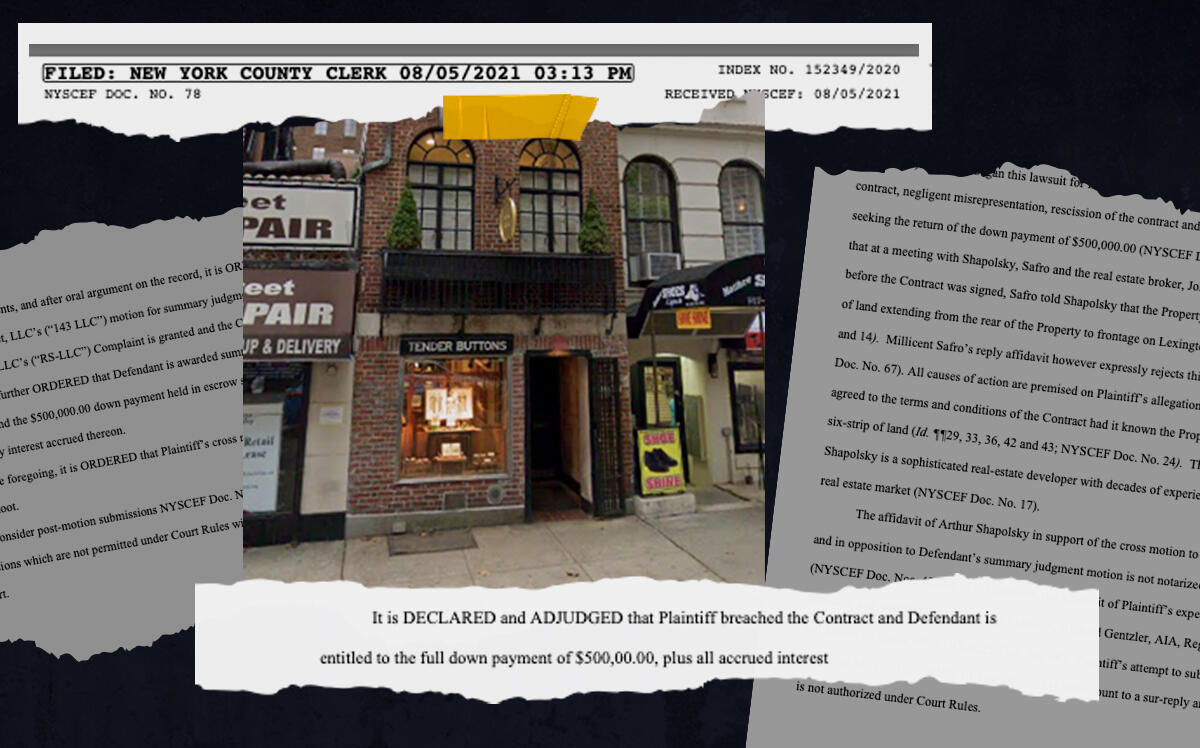 Portion of Champlain site in “danger of collapsing” and will be braced this weekend
Portion of Champlain site in “danger of collapsing” and will be braced this weekend
Trending
Court denies developer seeking elusive 6 inches
Arthur Shapolsky tried to undo $5M building purchase missing tiny strip of land

Developer Arthur Shapolsky’s lawsuit against the owner of a button shop is hanging by a thread.
Ruling on one of the stranger real estate cases in recent years, a judge awarded Milicent Safro, the former owner of Tender Buttons on the Upper East Side, $500,000 plus interest.
Shapolsky had agreed to pay $5.25 million for Safro’s four-story building at 143 East 62nd Street, but in 2019 sued to back out, claiming he had been duped by the retired shopkeeper into believing the lot included a 6-inch-wide strip connecting the parcel to Lexington Avenue.
The narrow link, he asserted, would have entitled him to lucrative building rights on the Midtown corridor.
Read more
 Portion of Champlain site in “danger of collapsing” and will be braced this weekend
Portion of Champlain site in “danger of collapsing” and will be braced this weekend
 Madison Realty Capital aims to foreclose on Hello Living’s 1580 Nostrand Ave
Madison Realty Capital aims to foreclose on Hello Living’s 1580 Nostrand Ave
Shapolsky sought to cancel the deal and reclaim his $500,000 deposit, alleging Safro and her broker had lied to him about the six-inch strip, which turned out not to exist.
But the judge affirmed that the contract, signed by Safro and Shapolsky, explicitly defined the bounds of the lot and made no reference to land reaching toward Lexington. Shapolsky can take his case to the Appellate Division, but cannot cite any issues there not raised at the trial court.
For more than 50 years, Safro operated a button shop on the ground floor of 143 East 62nd, a building she inherited from her partner, Diane Epstein, who died in 1998. Two years ago she closed the shop and signed the deal with Shapolsky.
His eponymous real estate firm, a self-described “empire,” has been acquiring buildings in Manhattan since 1935 — which worked against him in the case.
“Mr. Shapolsky is a sophisticated real-estate developer with decades of experience in the Manhattan real estate market,” wrote the judge, unconvinced that a little old lady who sold buttons had tricked an industry veteran.
The judge also noted two cases from the early 1990s in which Shapolsky himself was accused of fraud and got to keep the down payment, undermining his argument that Safro should return his.
Lawyers for both parties and Shapolsky did not respond immediately to requests for comment. Safro could not be reached.




